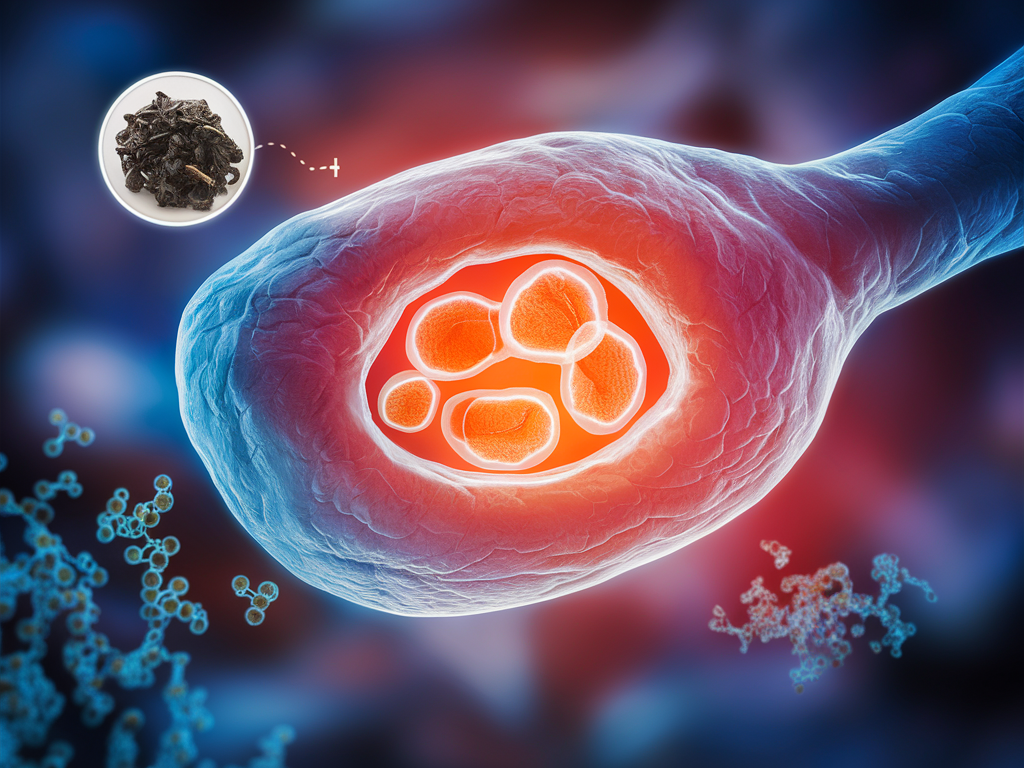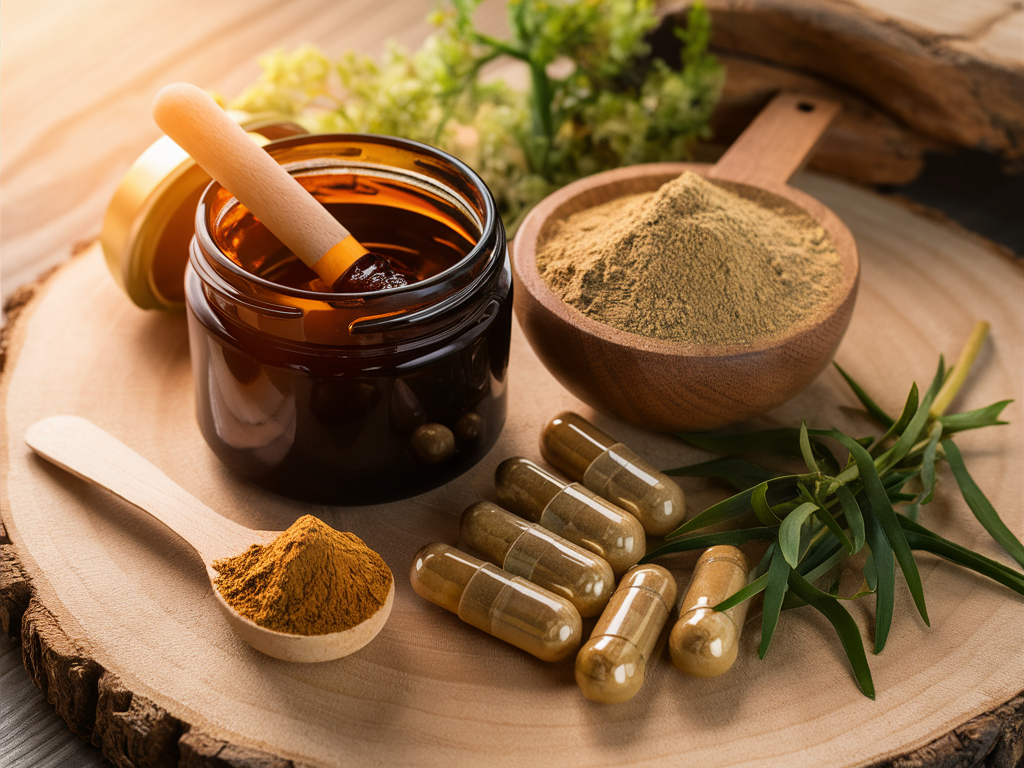Discover the remarkable natural substance that’s been capturing the attention of both traditional healers and modern scientists. Shilajit, a sticky resin exuded from high-altitude rocks in the Himalayas and other mountain ranges, has been used for thousands of years in Ayurvedic medicine. Today, cutting-edge research is validating what ancient practitioners have long known: this unique substance offers a wealth of potential health benefits. Let’s explore what science reveals about this fascinating natural compound.
Shilajit (also known as mumijo, mumie, or moomiyo) is a blackish-brown resinous substance that slowly exudes from layers of rock in mountainous regions, primarily the Himalayas. This tar-like material forms over centuries through the decomposition of plant matter and minerals, creating a complex substance rich in beneficial compounds.
In Sanskrit, “shilajit” translates to “conqueror of mountains” or “destroyer of weakness.” For over 3,000 years, traditional Ayurvedic medicine has revered shilajit as a rejuvenator and adaptogen. Ancient texts describe it as a powerful substance capable of enhancing strength, supporting vitality, and promoting longevity.
Modern analysis reveals shilajit contains over 84 minerals in ionic form, as well as fulvic acid, humic acid, amino acids, and plant-based antioxidants. Its primary bioactive component, fulvic acid, is believed to be responsible for many of its therapeutic properties by helping transport nutrients into deeper tissues and removing toxins.

Recent scientific research has begun to validate traditional claims, with numerous studies examining shilajit’s potential benefits for human health. From enhancing cellular energy production to supporting cognitive function, this ancient substance continues to impress researchers with its wide-ranging effects. Let’s examine what the science reveals about shilajit’s most promising health benefits.
The 10 Science-Backed Benefits of Shilajit
1. Enhances Energy and Combats Fatigue
One of shilajit’s most remarkable properties lies in its ability to influence cellular energy production. Research published in the Journal of Ethnopharmacology found that shilajit helps preserve and enhance mitochondrial function—the powerhouses within our cells responsible for generating ATP (adenosine triphosphate), our body’s primary energy currency.
Clinical studies show that shilajit supplementation can significantly increase ATP levels in various tissues. A 2012 study published in the Journal of Medicinal Food demonstrated that subjects taking shilajit experienced:
- Improved energy levels throughout the day
- Enhanced physical performance during exercise
- Reduced recovery time after exertion
This energy-enhancing effect aligns perfectly with traditional Ayurvedic applications, where shilajit was often prescribed to combat fatigue and boost stamina—particularly among those living in high-altitude regions where oxygen levels are lower and energy conservation is critical.
2. Supports Brain Health and Cognitive Function
Emerging research suggests shilajit may offer significant neuroprotective benefits. Rich in dibenzo-alpha-pyrones and fulvic acid, shilajit appears to help shield brain cells from damage while supporting optimal neural function.
A 2012 study published in the International Journal of Alzheimer’s Disease found that shilajit’s active components may inhibit the aggregation of tau protein—a process implicated in several neurodegenerative conditions. Additional research indicates shilajit may:
- Reduce oxidative stress in brain tissue
- Support memory formation and retention
- Help maintain acetylcholine levels, a neurotransmitter essential for learning
These findings help explain why traditional Ayurvedic practitioners often prescribed shilajit for “mental clarity” and “sharpness of intellect,” suggesting its potential as a natural cognitive supporter particularly relevant in our modern age of increased cognitive demands and longer lifespans.
3. Boosts Testosterone Levels and Male Fertility
Shilajit has demonstrated remarkable effects on male reproductive health. A pioneering clinical study published in Andrologia involved 60 infertile men who received shilajit twice daily for 90 days. The results showed significant increases in:
- Total testosterone levels (by up to 23.5%)
- Free testosterone (the biologically active form)
- Follicle-stimulating hormone (FSH), which supports sperm production
Beyond hormone production, research in the American Journal of Men’s Health found that shilajit supplementation improved several sperm parameters, including:
- Total sperm count (increased by 61.4%)
- Sperm motility (improved by 37.6%)
- Percentage of healthy sperm morphology
These benefits may result from shilajit’s mineral content, antioxidant properties, and ability to enhance cellular energy production—all crucial factors in male reproductive health. For men concerned about fertility or age-related testosterone decline, shilajit represents a scientifically-supported natural option.
4. Promotes Heart Health
Cardiovascular research suggests shilajit may offer protective benefits for heart health through multiple mechanisms. A study in the Journal of Cardiovascular Pharmacology found that shilajit’s fulvic acid content helps decrease blood pressure and heart rate in laboratory models.
Clinical research published in Archives of Medical Research demonstrated that shilajit supplementation positively influences lipid profiles by:
- Reducing total cholesterol and LDL (“bad” cholesterol) levels
- Increasing HDL (“good” cholesterol) concentrations
- Lowering triglyceride levels
Additionally, shilajit’s potent antioxidant properties help combat oxidative stress—a key contributor to heart disease. By neutralizing free radicals, shilajit may help maintain the integrity of blood vessel walls and support proper cardiac function.
5. Offers Anti-Aging Properties
The anti-aging potential of shilajit stems from its remarkable effects on cellular processes associated with aging. Research in the Journal of Ethnopharmacology suggests shilajit may activate cellular mechanisms that enhance longevity and vitality.
Multiple studies highlight shilajit’s ability to:
- Support mitochondrial function, maintaining cellular energy production as we age
- Activate genes associated with cellular repair and longevity
- Reduce the accumulation of advanced glycation end products (AGEs), compounds that accelerate aging

Fulvic acid, shilajit’s key component, is particularly effective at neutralizing free radicals and reducing oxidative damage—one of the primary mechanisms of aging at the cellular level. This may explain why traditional texts describe shilajit as “rasayana” (rejuvenative) and claim it can help maintain youthfulness and vitality.
6. Enhances Nutrient Absorption
One of shilajit’s most valuable properties is its ability to enhance the bioavailability and absorption of nutrients. Research in the Journal of Medicinal Food demonstrates that fulvic acid in shilajit helps transport minerals across cellular membranes, making nutrients more accessible to tissues.
Studies show that when combined with other supplements or nutrients, shilajit can:
- Increase absorption rates of essential minerals like zinc, iron, and magnesium
- Enhance uptake of fat-soluble vitamins
- Improve cellular utilization of nutrients
This enhanced nutritional delivery system works through several mechanisms, including improved gut barrier function and increased permeability of cell membranes to beneficial compounds. By optimizing nutrient absorption, shilajit helps ensure the body can fully utilize dietary and supplemental nutrients—particularly important for those with compromised digestive function or increased nutritional needs.
7. Supports Immune System Function
Research published in the International Immunopharmacology journal reveals shilajit possesses significant immunomodulatory properties. Rather than simply stimulating or suppressing immune function, shilajit appears to help regulate and balance immune responses.
Clinical and laboratory studies show shilajit can:
- Enhance the activity of natural killer (NK) cells, important for targeting viral infections and cancer cells
- Modulate inflammatory cytokine production
- Support phagocytosis—the process by which immune cells engulf and destroy pathogens
The humic substances in shilajit exhibit antibacterial and antiviral properties, providing additional protection against infections. These immunomodulatory effects align with traditional uses of shilajit for strengthening resilience against disease and maintaining wellness through changing seasons.
8. Helps Manage Blood Sugar Levels
Emerging research suggests shilajit may offer benefits for glucose metabolism and insulin sensitivity. A study in the Journal of Diabetes Research found that shilajit supplementation helps activate PPAR-? (peroxisome proliferator-activated receptor gamma)—a protein that regulates glucose metabolism and improves insulin sensitivity.
Scientific investigations reveal several mechanisms by which shilajit may support healthy blood sugar levels:
- Reducing oxidative stress in pancreatic beta cells, which produce insulin
- Improving cellular glucose uptake
- Modulating enzymes involved in carbohydrate metabolism
While more clinical research is needed, these preliminary findings suggest shilajit may serve as a complementary approach for those concerned about blood sugar management. Researchers note that shilajit’s blood sugar balancing effects appear to be gradual and cumulative, suggesting benefit from consistent long-term use.
9. Provides Adaptogenic Stress Relief
Adaptogens are substances that help the body resist physical, chemical, and biological stressors, and shilajit demonstrates classic adaptogenic properties. Research in the Journal of Ethnopharmacology confirms shilajit can modulate the hypothalamic-pituitary-adrenal (HPA) axis—our body’s primary stress response system.
Studies reveal that regular shilajit consumption may:
- Normalize cortisol levels (the primary stress hormone)
- Support adrenal gland function and resilience
- Reduce anxiety markers in response to stressful stimuli
These adaptogenic effects may be particularly relevant in our modern high-stress environment. Clinical observations suggest shilajit can help the body maintain homeostasis during periods of increased stress, potentially reducing the negative physical and mental impacts of chronic stress exposure.
10. Supports Skeletal and Joint Health
Shilajit contains several compounds that may benefit bone and joint health. Research published in Pharmacognosy Research demonstrates that shilajit supplementation can positively influence bone regeneration and mineralization.
Clinical and laboratory investigations indicate shilajit may:
- Support increased bone mineral density and strength
- Reduce inflammatory markers associated with joint discomfort
- Promote collagen synthesis and cartilage regeneration
Its mineral content, including calcium, magnesium, phosphorus, and silicon in bioavailable forms, provides essential building blocks for bone formation. Additionally, shilajit’s anti-inflammatory properties may help reduce joint inflammation and discomfort, particularly in inflammatory conditions like arthritis, aligning with its traditional applications for joint health in Ayurvedic medicine.
Potential Side Effects and Precautions
While research supports shilajit’s safety when used appropriately, being aware of potential side effects and contraindications is important. Clinical studies have documented several considerations:
Common side effects – Generally mild and infrequent:
- Digestive discomfort or mild nausea when first starting supplementation
- Altered taste perception (typically temporary)
- Headaches in sensitive individuals (usually dose-related)
Medication interactions – Shilajit may interact with:
- Iron supplements (may enhance absorption, potentially requiring dosage adjustments)
- Blood thinners (due to possible effects on clotting)
- Medications for diabetes (may enhance blood sugar-lowering effects)
Special precautions – Shilajit is not recommended for:
- Pregnant or breastfeeding women (insufficient safety data)
- Children under 18 (not adequately studied)
- People with sickle cell anemia, thalassemia, or hemochromatosis (due to its iron content)
- Those with gout or elevated uric acid levels (may exacerbate symptoms)
Most clinical studies have used dosages ranging from 300-500mg daily of purified shilajit. Starting with a lower dose and gradually increasing can help minimize adjustment reactions. As with any supplement, consulting with a healthcare provider before beginning shilajit is advisable, especially for those with pre-existing health conditions or taking medications.
How to Choose a Quality Shilajit Supplement
The quality and efficacy of shilajit supplements vary dramatically in the marketplace. Here’s what research and experts suggest for selecting a high-quality product:
Purity considerations:
- Look for products tested for heavy metals and environmental contaminants
- Verify third-party laboratory testing with available certificates of analysis
- Choose supplements that specify fulvic acid content (typically 15-20% in quality products)
Forms available:
- Resin: The most traditional and potent form, though taste may be challenging
- Powder: More convenient but verify it’s not diluted with fillers
- Capsules: Most convenient though may contain additional binders
Label transparency:
- Verify geographical source (authentic Himalayan or Altai Mountain sources are preferred)
- Check extraction methods (traditional water extraction preserves bioactive compounds)
- Confirm standardization percentages of key compounds like fulvic acid

Red flags to avoid:
- Extremely low prices (quality shilajit is resource-intensive to harvest and process)
- Products lacking specific information about sourcing and testing
- Excessive fillers, additives, or bulking agents on ingredient lists
The most reputable manufacturers typically provide detailed information about their sourcing, purification processes, and quality control measures. Some even offer traceability to specific harvesting regions, ensuring authenticity and ecological sustainability.
Conclusion: Ancient Wisdom Meets Modern Science
Shilajit represents a fascinating intersection of traditional healing wisdom and contemporary scientific validation. The research reviewed here suggests this ancient substance offers multiple evidence-based benefits that align remarkably well with its traditional applications. From cellular energy enhancement to hormonal balance, cognitive support to adaptogenic properties, shilajit’s spectrum of effects makes it one of the most comprehensively beneficial natural substances under scientific investigation.
Those who may benefit most from shilajit supplementation include:
- Individuals experiencing fatigue or diminished energy levels
- Men concerned about testosterone levels or fertility
- Those seeking cognitive support and neuroprotection
- People experiencing high stress or adapting to challenging conditions
- Individuals looking for complementary approaches to metabolic health
While the research is promising, responsible use remains important. Consulting with healthcare providers before beginning any new supplement regimen ensures safety and appropriateness for individual health circumstances. As with many traditional remedies gaining scientific validation, shilajit offers an opportunity to bridge ancient healing traditions with evidence-based approaches to health and wellness.
With ongoing research continuing to illuminate its mechanisms and benefits, shilajit exemplifies how traditional substances can find their place in contemporary integrative health practices—backed not just by centuries of empirical use, but also by the rigorous validation of modern science.

